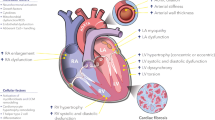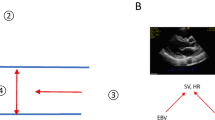Summary
Substances creating prevalence of the catecholamine system (iprazid) or of the acetylcholine system (proserine, reserpine) were administered to rats with experimental coarctation of aorta. The evidence proved that proserine and reserpine increase the degree of hypertrophy. The results thus obtained are examined in the light of interrelations between the contractile function level of the myocardium and its hypertrophy.
Similar content being viewed by others
Literature Cited
F. Z. Meerson, Compensatory Hyperfunction and Failure of the Heart [in Russian], Moscow (1960).
W. Lee and F. Shideman, Science, Vol. 129 (1959), p. 967.
Author information
Authors and Affiliations
Rights and permissions
About this article
Cite this article
Meerzon, F.Z., Rozanova, L.S. Effect of changes in mediator metabolism on the development of cardiac hypertrophy. Bull Exp Biol Med 57, 282–284 (1964). https://doi.org/10.1007/BF00781908
Received:
Issue Date:
DOI: https://doi.org/10.1007/BF00781908




